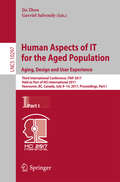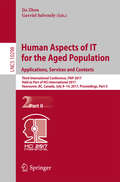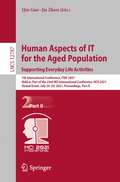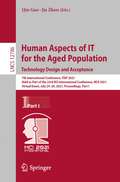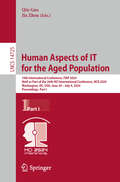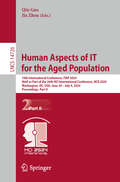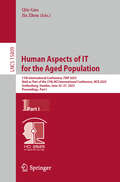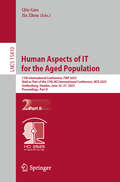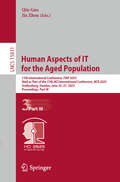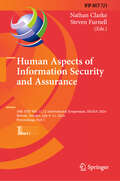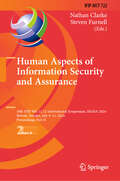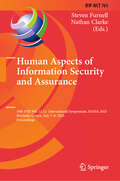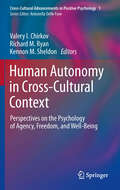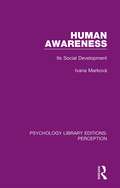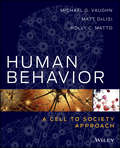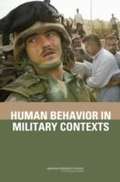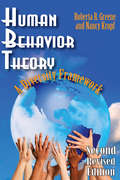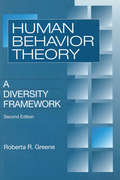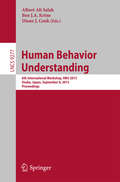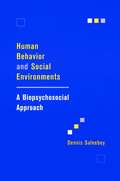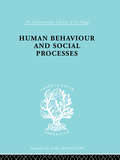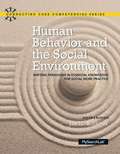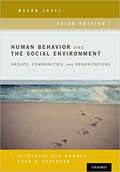- Table View
- List View
Human Aspects of IT for the Aged Population. Aging, Design and User Experience
by Gavriel Salvendy Jia ZhouThe two-volume set LNCS 10297 + 10298 constitutes the refereed proceedings of the Third International Conference on Human Aspects of IT for the Aged Population, ITAP 2017, held as part of HCI International 2017 in Vancouver, BC, Canada. HCII 2017 received a total of 4340 submissions, of which 1228 papers were accepted for publication after a careful reviewing process. The 83 papers presented in the two volumes of ITAP 2017 were organized in topical sections as follows: Part I: aging and technology acceptance; user-centred design for the elderly; product design for the elderly; aging and user experience; digital literacy and training. Part II: mobile and wearable interaction for the elderly; aging and social media; silver and intergenerational gaming; health care and assistive technologies and services for the elderly; aging and learning, working and leisure.
Human Aspects of IT for the Aged Population. Applications, Services and Contexts
by Gavriel Salvendy Jia ZhouThe two-volume set LNCS 10297 + 10298 constitutes the refereed proceedings of the Third International Conference on Human Aspects of IT for the Aged Population, ITAP 2017, held as part of HCI International 2017 in Vancouver, BC, Canada. HCII 2017 received a total of 4340 submissions, of which 1228 papers were accepted for publication after a careful reviewing process. The 83 papers presented in the two volumes of ITAP 2017 were organized in topical sections as follows: Part I: aging and technology acceptance; user-centred design for the elderly; product design for the elderly; aging and user experience; digital literacy and training. Part II: mobile and wearable interaction for the elderly; aging and social media; silver and intergenerational gaming; health care and assistive technologies and services for the elderly; aging and learning, working and leisure.
Human Aspects of IT for the Aged Population. Supporting Everyday Life Activities: 7th International Conference, ITAP 2021, Held as Part of the 23rd HCI International Conference, HCII 2021, Virtual Event, July 24–29, 2021, Proceedings, Part II (Lecture Notes in Computer Science #12787)
by Jia Zhou Qin GaoThis two-volume set constitutes the proceedings of the 7th International Conference on Human Aspects of IT for the Aged Population, ITAP 2021, held as part of the 23rd International Conference, HCI International 2021, held as a virtual event, in July 2021. The total of 1276 papers and 241 posters included in the 36 HCII 2021 proceedings volumes was carefully reviewed and selected from 5222 submissions. ITAP 2021 includes a total of 67 regular papers; they focus on topics related to designing for and with older users, technology acceptance and user experience of older users, use of social media and games by the aging population, as well as applications supporting health, wellbeing, communication, social participation and everyday activities.
Human Aspects of IT for the Aged Population. Technology Design and Acceptance: 7th International Conference, ITAP 2021, Held as Part of the 23rd HCI International Conference, HCII 2021, Virtual Event, July 24–29, 2021, Proceedings, Part I (Lecture Notes in Computer Science #12786)
by Jia Zhou Qin GaoThis two-volume set constitutes the proceedings of the 7th International Conference on Human Aspects of IT for the Aged Population, ITAP 2021, held as part of the 23rd International Conference, HCI International 2021, held as a virtual event, in July 2021. The total of 1276 papers and 241 posters included in the 36 HCII 2021 proceedings volumes was carefully reviewed and selected from 5222 submissions. ITAP 2021 includes a total of 67 regular papers; they focus on topics related to designing for and with older users, technology acceptance and user experience of older users, use of social media and games by the aging population, as well as applications supporting health, wellbeing, communication, social participation and everyday activities.
Human Aspects of IT for the Aged Population: 10th International Conference, ITAP 2024, Held as Part of the 26th HCI International Conference, HCII 2024, Washington, DC, USA, June 29–July 4, 2024, Proceedings, Part I (Lecture Notes in Computer Science #14725)
by Jia Zhou Qin GaoThis two-volume set LNCS 14725-14726 constitutes the thoroughly refereed proceedings of the 10th International Conference on Human Aspects of IT for the Aged Population (ITAP 2024), held as part of the 26th International Conference on Human-Computer Interaction, HCI International 2024 (HCII 2024), was held as a hybrid event in Washington DC, USA, during June/July 2024. The total of 1271 papers and 309 posters included in the HCII 2023 proceedings was carefully reviewed and selected from 5108 submissions. The ITAP 2024 conference offers a broad range of relevant disciplines and domains to exchange 1) research contributions on older people's abilities and competencies, needs and requirements, and attitudes and behavioral patterns in relation to IT use; 2) innovative ideas, practices, and experiences related to the design, operation, and evaluation of IT applications, systems, and services for older people.
Human Aspects of IT for the Aged Population: 10th International Conference, ITAP 2024, Held as Part of the 26th HCI International Conference, HCII 2024, Washington, DC, USA, June 29–July 4, 2024, Proceedings, Part II (Lecture Notes in Computer Science #14726)
by Jia Zhou Qin GaoThis two-volume set LNCS 14725-14726 constitutes the thoroughly refereed proceedings of the 10th International Conference on Human Aspects of IT for the Aged Population (ITAP 2024), held as part of the 26th International Conference on Human-Computer Interaction, HCI International 2024 (HCII 2024), was held as a hybrid event in Washington DC, USA, during June/July 2024. The total of 1271 papers and 309 posters included in the HCII 2023 proceedings was carefully reviewed and selected from 5108 submissions. The ITAP 2024 conference offers a broad range of relevant disciplines and domains to exchange 1) research contributions on older people's abilities and competencies, needs and requirements, and attitudes and behavioral patterns in relation to IT use; 2) innovative ideas, practices, and experiences related to the design, operation, and evaluation of IT applications, systems, and services for older people.
Human Aspects of IT for the Aged Population: 11th International Conference, ITAP 2025, Held as Part of the 27th HCI International Conference, HCII 2025, Gothenburg, Sweden, June 22–27, 2025, Proceedings, Part I (Lecture Notes in Computer Science #15809)
by Jia Zhou Qin GaoThe three-volume set LNCS 15809-15811 constitutes the thoroughly refereed proceedings of the 11th International Conference on Human Aspects of IT for the Aged Population, ITAP 2025, held as part of the 27th HCI International Conference on Human-Computer Interaction, HCII 2025, which took place in Gothenburg, Sweden, in June 2025. The total of 1430 papers and 355 posters included in the HCII 2025 proceedings was carefully reviewed and selected from 7972 submissions. The three volumes cover topics as follows: Part I: Designing Older User Experiences; Social Connectedness and Psychological Support Part II: Smart Homes and Communities for Aging in Place; eHealth for Aging Part III: Older Adults and the (Smart) City; Technology Adoption, IT Literacy and the Digital Divide; Living with AI.
Human Aspects of IT for the Aged Population: 11th International Conference, ITAP 2025, Held as Part of the 27th HCI International Conference, HCII 2025, Gothenburg, Sweden, June 22–27, 2025, Proceedings, Part II (Lecture Notes in Computer Science #15810)
by Jia Zhou Qin GaoThe three-volume set LNCS 15809-15811 constitutes the thoroughly refereed proceedings of the 11th International Conference on Human Aspects of IT for the Aged Population, ITAP 2025, held as part of the 27th HCI International Conference on Human-Computer Interaction, HCII 2025, which took place in Gothenburg, Sweden, in June 2025. The total of 1430 papers and 355 posters included in the HCII 2025 proceedings was carefully reviewed and selected from 7972 submissions. The three volumes cover topics as follows: Part I: Designing Older User Experiences; Social Connectedness and Psychological Support Part II: Smart Homes and Communities for Aging in Place; eHealth for Aging Part III: Older Adults and the (Smart) City; Technology Adoption, IT Literacy and the Digital Divide; Living with AI.
Human Aspects of IT for the Aged Population: 11th International Conference, ITAP 2025, Held as Part of the 27th HCI International Conference, HCII 2025, Gothenburg, Sweden, June 22–27, 2025, Proceedings, Part III (Lecture Notes in Computer Science #15811)
by Jia Zhou Qin GaoThe three-volume set LNCS 15809-15811 constitutes the thoroughly refereed proceedings of the 11th International Conference on Human Aspects of IT for the Aged Population, ITAP 2025, held as part of the 27th HCI International Conference on Human-Computer Interaction, HCII 2025, which took place in Gothenburg, Sweden, in June 2025. The total of 1430 papers and 355 posters included in the HCII 2025 proceedings was carefully reviewed and selected from 7972 submissions. The three volumes cover topics as follows: Part I: Designing Older User Experiences; Social Connectedness and Psychological Support Part II: Smart Homes and Communities for Aging in Place; eHealth for Aging Part III: Older Adults and the (Smart) City; Technology Adoption, IT Literacy and the Digital Divide; Living with AI.
Human Aspects of Information Security and Assurance: 18th IFIP WG 11.12 International Symposium, HAISA 2024, Skövde, Sweden, July 9–11, 2024, Proceedings, Part I (IFIP Advances in Information and Communication Technology #721)
by Nathan Clarke Steven FurnellThe two-volume set IFIP AICT 721 + 722 constitutes the proceedings of the 18th IFIP WG 11.12 International Symposium on Human Aspects of Information Security and Assurance, HAISA 2024, held in Skövde, Sweden, in July 9–11, 2024. The 39 full papers presented were carefully reviewed and selected from 55 submissions. The papers are organized in the following topical sections: Part I - Management and Risk; Social Engineering; Technical Attacks and Defenses; Usable Security. Part II - Awareness and Education; Privacy.
Human Aspects of Information Security and Assurance: 18th IFIP WG 11.12 International Symposium, HAISA 2024, Skövde, Sweden, July 9–11, 2024, Proceedings, Part II (IFIP Advances in Information and Communication Technology #722)
by Nathan Clarke Steven FurnellThe two-volume set IFIP AICT 721 +722 constitutes the proceedings of the 18th IFIP WG 11.12 International Symposium on Human Aspects of Information Security and Assurance, HAISA 2024, held in Skövde, Sweden, in July 9–11, 2024. The 39 full papers presented were carefully reviewed and selected from 55 submissions. The papers are organized in the following topical sections: Part I - Management and Risk; Social Engineering; Technical Attacks and Defenses; Usable Security. Part II - Awareness and Education; Privacy.
Human Aspects of Information Security and Assurance: 19th IFIP WG 11.12 International Symposium, HAISA 2025, Mytilene, Greece, July 7–9, 2025, Proceedings (IFIP Advances in Information and Communication Technology #761)
by Nathan Clarke Steven FurnellThis volume constitutes the proceedings of the 19th IFIP WG 11.12 International Symposium on Human Aspects of Information Security and Assurance, HAISA 2025, held in Mytilene, Greece, during July 7–9, 2025. The 30 full papers presented were carefully reviewed and selected from 38 submissions. The papers are organized in the following topical sections: Awareness & Education; Security Culture; Privacy and Technical Attacks & Defenses.
Human Attention in Digital Environments
by Claudia RodaDigital systems, such as phones, computers and PDAs, place continuous demands on our cognitive and perceptual systems. They offer information and interaction opportunities well above our processing abilities, and often interrupt our activity. Appropriate allocation of attention is one of the key factors determining the success of creative activities, learning, collaboration, and many other human pursuits. This book presents research related to human attention in digital environments. Original contributions by leading researchers cover the conceptual framework of research aimed at modelling and supporting human attentional processes, the theoretical and software tools currently available, and various application areas. The authors explore the idea that attention has a key role to play in the design of future technology and discuss how such technology may continue supporting human activity in environments where multiple devices compete for people's limited cognitive resources.
Human Autonomy in Cross-Cultural Context
by Kennon M. Sheldon Richard Ryan Valery I. ChirkovThis volume presents the reader with a stimulating tapestry of essays exploring the nature of personal autonomy, self-determination, and agency, and their role in human optimal functioning at multiple levels of analysis from personal to societal and cross-cultural. The starting point for these explorations is self-determination theory, an integrated theory of human motivation and healthy development which has been under development for more than three decades (Deci & Ryan, 2000). As the contributions will make clear, psychological autonomy is a concept that forms the bridge between the dependence of human behavior on biological and socio-cultural determinants on the one side, and people's ability to be free, reflective, and transforming agents who can challenge these dependencies, on the other. The authors within this volume share a vision that human autonomy is a fundamental pre-condition for both individuals and groups to thrive, and that without understanding the nature and mechanisms of autonomous agency vital social and human problems cannot be satisfactory addressed. This multidisciplinary team of researchers will collectively explore the nature of personal autonomy, considering its developmental origins, its expression within relationships, its importance within groups and organizational functioning, and its role in promoting to the democratic and economic development of societies. The book is aimed toward developmental, social, personality, and cross-cultural psychologists, towards researchers and practitioners' in the areas of education, health and medicine, social work and, economics, and also towards all interested in creating a more sustainable and just world society through promoting individual freedom and agency. This volume will provide a theoretical and conceptual account of the nature and psychological mechanisms of personal motivational autonomy and human agency; rich multidisciplinary empirical evidence supporting the claims and propositions about the nature of human autonomy and capacities for self-regulation; explanations of how and why different psychological and socio-cultural conditions may play a role in promoting or undermining people's autonomous motivation and well-being, discussions of how the promotion of human autonomy can positively influence environmental protection, democracy promotion and economic prosperity.
Human Awareness: Its Social Development (Psychology Library Editions: Perception #19)
by Ivana MarkováHuman awareness – which forms the basis of all interpersonal relationships – is perhaps the most fascinating phenomenon of biological and socio-cultural evolution. In this innovative book, originally published in 1987, the author introduces the subject of human awareness from the perspective of developmental and social psychology. Using a wide range of psychological and other sources, both classic and more recent from around the world, the book begins with a discussion of awareness as a biological and cultural-historical phenomenon. The reader is then guided through such issues as one’s awareness of others, self-awareness, interpersonal communication, and the search of human beings for recognition by others. The final chapter focuses on human awareness as a relationship between the self and society, with particular emphasis on social stability and change. Human Awareness provided the first comprehensive account of human consciousness in a text that reflected the most exciting recent research in the field at the time and emphasized the need for an integrated and coherent understanding of the various psychological disciplines.
Human Barrier Design and Lifecycle: A Cognitive Ergonomics Approach and Path Forward
by Tom ShephardA common source of failure in a human‑dependent barrier or safety critical task is a designed‑in mismatch error. The mismatch is a cognitive demand that exceeds the human capability to reliably and promptly respond to that demand given the plausible situations at that moment. Demand situations often include incomplete information, increased time pressures, and challenging environments. This book presents innovative solutions to reveal, prevent, and mitigate these and many other cognitive‑type errors in barriers and safety critical tasks. The comprehensive model and methodologies also provide insight into where and to what extent these barriers and task types may be significantly underspecified and the potential consequences.This title presents a new and comprehensive prototype design and lifecycle model specific to human‑dependent barriers and safety critical tasks. Designed to supplement current practice, the model is fully underpinned by cognitive ergonomics and cognitive science. The book also presents a compelling case for why a new global consensus standard specific to human‑dependent barriers is needed. Taking a novel approach, it presents its suggested basis, framing, and content. Both solutions seek to redress deficiencies in global regulations, standards, and practice. The model is guided by industry recommendations and best practice guidance and solutions from globally recognized experts. Its processes are fully explained and supported by examples, analysis, and well‑researched background materials. Real‑life case studies from offshore oil and gas, chemical manufacturing, transmission pipelines, and product storage provide further insight into how overt and latent design errors contributed to barrier degradation and failure and the consequence of those errors.An essential and fascinating read for professionals, Human Barrier Design and Lifecycle: A Cognitive Ergonomics Approach and Path Forward will appeal to those in the fields of human factors, process and technical safety, functional safety, display and safety system design, risk management, facility engineering, and facility operations and maintenance.Chapters 1 and 8 of this book are freely available as downloadable Open Access PDFs at http://www.taylorfrancis.com under a Creative Commons Attribution-Non Commercial-No Derivatives (CC-BYNC-ND) 4.0 International license.
Human Behavior
by Michael G. Vaughn Holly C. Matto Matt DelisiA unique approach to human behavior that integrates and interprets the latest research from cell to societyIncorporating principles and findings from molecular biology, neuroscience, and psychological and sociocultural sciences, Human Behavior employs a decidedly integrative biosocial, multiple-levels-of-influence approach. This approach allows students to appreciate the transactional forces shaping life course opportunities and challenges among diverse populations in the United States and around the world.Human Behavior includes case studies, Spotlight topics, and Expert's Corner features that augment the theme of each chapter. This book is rooted in the principles of empirical science and the evidence-based paradigm, with coverage of:Genes and behaviorStress and adaptationExecutive functionsTemperamentPersonality and the social work professionSocial exchange and cooperationSocial networks and psychosocial relationsTechnologyThe physical environmentInstitutionsBelief systems and ideologyUnique in its orientation, Human Behavior proposes a new integrative perspective representing a leap forward in the advancement of human behavior for the helping professions."This book is like no other HBSE textbook that I have used in my teaching career. Traditional HBSE content is included within the chapters, and the authors do an excellent job of explaining complex perspectives on human development from the genome to the brain to temperament and risks in the environment. The book challenges faculty and students to look at 21st-century HBSE."-Carmen Ortiz Hendricks, DSW, ACSW, Dorothy and David I. Schachne Dean, Wurzweiler School of Social Work, Yeshiva University"This book represents a changing of the guard and a new era of thinking. Vaughn, DeLisi, and Matto have essentially replaced the so-called classic texts with their comprehensive and integrative review of the most current and relevant theory and research that is essential in understanding the complexities of human behavior. Educators will be hard pressed to find another text that will engage, challenge, and excite students in the way this book does."-Brian Perron, PhD, Associate Professor, School of Social Work, University of Michigan
Human Behavior In Military Contexts
by National Research Council of the National AcademiesHuman behavior forms the nucleus of military effectiveness. Humans operating in the complex military system must possess the knowledge, skills, abilities, aptitudes, and temperament to perform their roles effectively in a reliable and predictable manner, and effective military management requires understanding of how these qualities can be best provided and assessed. Scientific research in this area is critical to understanding leadership, training and other personnel issues, social interactions and organizational structures within the military. The U.S. Army Research Institute for the Behavioral and Social Sciences (ARI) asked the National Research Council to provide an agenda for basic behavioral and social research focused on applications in both the short and long-term. The committee responded by recommending six areas of research on the basis of their relevance, potential impact, and timeliness for military needs: intercultural competence; teams in complex environments; technology-based training; nonverbal behavior; emotion; and behavioral neurophysiology. The committee suggests doubling the current budget for basic research for the behavioral and social sciences across U.S. military research agencies. The additional funds can support approximately 40 new projects per year across the committee's recommended research areas. Human Behavior in Military Contexts includes committee reports and papers that demonstrate areas of stimulating, ongoing research in the behavioral and social sciences that can enrich the military's ability to recruit, train, and enhance the performance of its personnel, both organizationally and in its many roles in other cultures.
Human Behavior Theory: A Diversity Framework (Modern Applications Of Social Work Ser.)
by Nancy KropfAs American society becomes increasingly diverse, social workers must use a variety of human behavior frameworks to understand their clients' culturally complex concerns. This text applies specific human behavior theories to diversity practice. They show how human behavior theory can be employed in interventions in the life problems of diverse client populations at the individual, group, social network, and societal levels.Several groups are examined. They include: minority groups; ethnic groups; women; older adults; members of certain social classes affected by economic and educational (dis)advantage, especially those living in poverty; people with developmental disabilities, people of varying sexual and gender orientations, and religious groups.Case studies that illustrate social work practice in the area are highlighted. The case studies include Social Work Practice within a Diversity Framework; The Social Work Interview; Symbolic Interactionism: Social Work Assessment, Meaning, and Language; Erikson's Eight Stages of Development; Role Theory and Social Work Practice; A Constructionist Approach; Risk, Resilience and Resettlement; Addressing Diverse Family Forms; Small Group Theory; Natural Social Networks; Power Factors in Social Work Practice. This volume will be a fundament resource for practitioners and an essential tool for training.
Human Behavior Theory: A Diversity Framework (Modern Applications Of Social Work Ser.)
by Roberta GreeneIn recent years, advocates for civil rights for minorities, women, and gays and lesbians have become more informed consumers of mental health services. As a result, social work practitioners need to prepare themselves to serve diverse constituencies for who previously held behavioral and cultural assumptions have proven not to be universally applicable. The purpose of Greene's book is to help students and practitioners better understand how social workers have used human behavior theories to more competently address variations in group and community membership within the social worker-client encounter.The book's approach is largely thematic. Most of the chapters explore how particular assumptions of a human behavior theory--psychoanalytic theory, psychodynamic/ego psychology theory, systems theory, behavioral theory, symbolic interaction theory, feminist theory, constructionist theory, small group theory, and an ecological perspective --have been used to answer issues related to cultural diversity. The challenges and limitations of each theory's applications across varying client constituencies are discussed throughout. What sorts of new conceptual issues for the practitioner of family services are raised in work with minority families, for example, or with lesbian families? How does a specific theory help, or not help, in group-specific interventions and evaluations?Intended as a companion volume to the widely adopted human behavior text by Greene and Ephross, Greene's new book fills the need for a wide, synthetic reading of the recent literature.
Human Behavior Understanding
by Albert Ali Salah Diane J. Cook Ben J.A. KröseThis book constitutes the proceedings of the 6th International Workshop on Human Behavior Understanding, HBU 2015, held in Osaka, Japan, in September 2015. The 11 full papers were carefully reviewed and selected from 15 initial submissions. They are organized in topical sections named: interaction with elderly, learning behavior patterns, and mobile solutions.
Human Behavior and Social Environments: A Biopsychosocial Approach (Foundations of Social Work Knowledge Series)
by Dennis SaleebeyHuman behavior is a subject so vast that it would seem to defy one's ability to comfortably and confidently grasp its varieties, nuances, shapes, and dynamics. But in this wide-ranging and comprehensive survey of the contexts of human behavior, Dennis Saleebey examines the different social science approaches to understanding the way humans react to and are affected by their environment.Using a biopsychosocial perspective, this book demonstrates that there are many paths of knowledge, many methods of inquiry, and many perspectives that can guide one's understanding of human behavior. Resilience (how we cope with trauma) and meaning-making (how we see and make sense of the world around us) provide the conceptual framework of the book. Saleebey examines a number of specific theories relevant to the biopsychosocial approach: part/whole analysis, psychodynamic theory, ecological theory, cognitive theory, and radical/critical theory. Human development is presented as a continuing interaction between individual, family, community, social institutions, and culture. Pedagogical devices to aid the student include chapter overviews, case studies, and meaning-making dialogues at the end of each chapter that pose questions for further thought.
Human Behavior and Social Processes: An Interactionist Approach (International Library of Sociology #Vol. 247)
by Arnold M. RoseFirst Published in 1998. Routledge is an imprint of Taylor & Francis, an informa company.
Human Behavior and The Social Environment: Shifting Paradigms in Essential Knowledge for Social Work Practice
by Joe M. SchriverHuman Behavior and the Social Environment, 6/e challenges students to explore both traditional and non-traditional paradigms in examining human behavior and the social environment. Through this examination, readers will better understand individuals, families, groups, organizations, communities and globalization. Students will recognize the range of social systems in which people live and the ways these systems promote or deter people in their health and wellbeing.
Human Behavior and the Social Environment, Macro Level: Groups, Communities, and Organizations
by Katherine Van Wormer Fred BesthornA timely revision in this global age, Human Behavior and the Social Environment, Macro Level develops a sophisticated and original view of the cultural, global, spiritual, and natural worlds that people inhabit, and explores the impact of these worlds on human behavior. An ecosystems/sustainability framework emerges as a key characteristic of contemporary practice. What is sustainable social work? What are the characteristics of a sustainable community? How is the present exploitation of environmental resources unsustainable for future generations? In accordance with the 2015 Council on Social Work Education (CSWE) standards, attention is paid to environmental justice as well as diversity and difference.
